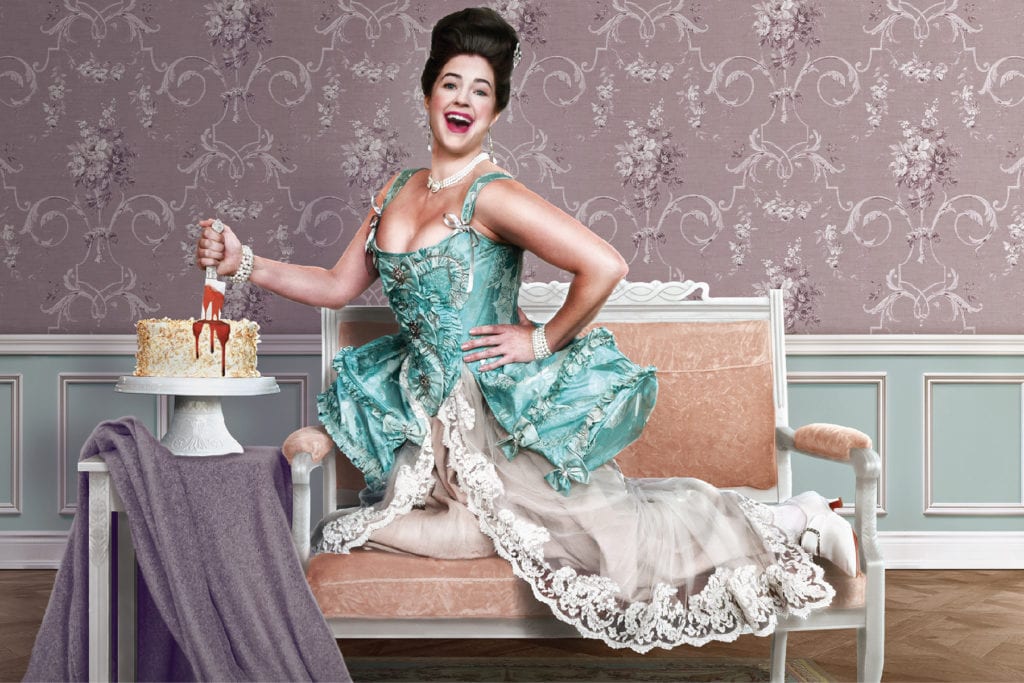
By Juliet Wittman (Read the original.)
The Revolutionists and BETC Show the Power of Women
In a true feat of the imagination, playwright Lauren Gunderson re-creates the French Revolution in an entirely original form in The Revolutionists. Currently receiving its regional premiere with the Boulder Ensemble Theatre Company, the play explores the Reign of Terror through the interactions of four women in 1793. Three of them are historical figures; the fourth, Marianne Angelle, is a composite representing the women of Saint-Domingue (now Haiti), who fought to free the island’s slaves and people of color during the same period. The other protagonists are feminist writer Olympe de Gouges; Charlotte Corday, who famously stabbed in the bath journalist-politician Jean-Paul Marat, advocate of the violent purge of anyone he considered a traitor; and Marie Antoinette, symbol of decadent royalty and the woman who supposedly said “Let them eat cake” when told the poor were hungry. (In fact, the quote is apocryphal.)
Not content with creating this small female prism for one of history’s largest and most sweeping events, Gunderson has set herself two more challenges. First, she makes the play funny: Act one is incredibly swift-moving and witty; the second still has laugh-out-loud moments, though it’s darkened by the looming presence of the guillotine. And while accomplishing all this, Gunderson also plays with form: The entire play is being created in front of our eyes by Olympe. Sometimes she hesitates, wavers, wonders if this shouldn’t be a musical. Or, as Marie Antoinette suggests, a romantic comedy — which, Marie points out, would pull in far bigger audiences. Or perhaps Olympe should scratch the idea of a play altogether and instead write a Declaration of the Rights of Women, something the real-life de Gouges actually did and which, along with other writings, cost her her life.
The other women have different ideas about the task. Charlotte just needs Olympe to write one line, a zinger to serve as her last words. Marie wants a rewrite of her life, to be represented as she sees herself, rather than as a loathed and caricatured queen. As for brave Marianne, she urges Olympe to write the overall narrative without flinching, the true and inspiring story of the struggle for freedom. Olympe may be terrified of the dangers of observation, as well as being sometimes petty and vain, but history and truth require no less, Marianne insists. Olympe knows this herself: “Story is the heartbeat of humanity,” she says early in the play, “and humanity gets really dark when the wrong stories are leading the people.” Miraculously, Gunderson pulls all this off with style and depth.
The Revolutionists touches on important truths: for instance, that revolution can be an ugly business and that uprisings sprung from the purest idealism often degenerate into a welter of bloody repression. As these very different women come together, they find a sisterly unity, though not in any sentimental, Hallmark-card kind of way, and Gunderson suggests that a revolution in which women fully participate might be — despite Corday’s startling act of violence — a little less brutal and a little more just. Beneath all the women’s arguments, there’s a pulse of shared understanding that’s wondrously expressed in the scene when Queen Marie Antoinette comforts Marianne, representative of slaves, on the loss of her husband and hands her a present: a teacup with a pretty bow for her young daughter. “Let us laugh too loudly and too often,” Marianne says later, “and call out the hypocrites of our age until they are the butt of the joke. That’s what we give our children. A good laugh.”
But all the riches of the script — humor, wit, pathos, moments of insight — would mean nothing without a superb production, which this is. The entire crew — set, lighting, costumes, sound — is female. Director Allison Watrous has also cast the play beautifully. Rebecca Remaly is an appealing Olympe, anchoring the action as her character moves between vacillation and moments of determination. Maire Higgins makes Charlotte a tough, funny, fling-about country girl, and Jada Suzanne Dixon brings calm authority to the role of Marianne. And then there’s Marie Antoinette: Adrian Egolf fills a role most actors would kill for to the vain, hilarious, regal hilt. She’s childish, arrogant and sweet, and I’d see this production again and again just to watch the fluttery, dancerly movement of her hands.
The Revolutionists, presented by the Boulder Ensemble Theatre Company through October 8, Dairy Arts Center, 303-351-2382, betc.org.
